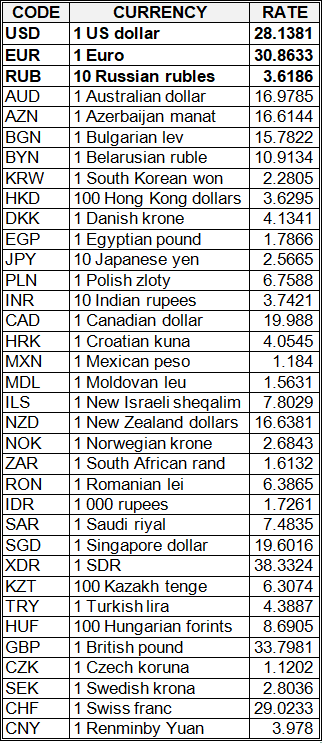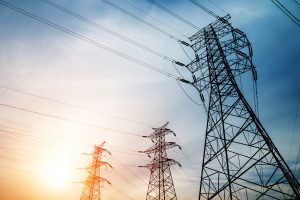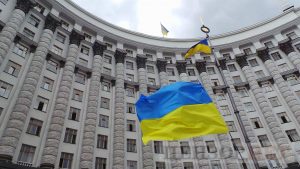National bank of ukraine’s official rates as of 27/03/20

Source: National Bank of Ukraine

Ukraine in January-February 2020 increased its electricity exports by 33.7% or 362.5 million kWh year-over-year, to 1.438 billion kWh, the Energy and Environmental Protection Ministry of Ukraine has told Interfax-Ukraine. Electricity supplies from the Burshtyn TPP energy island to Hungary, Slovakia, and Romania rose by 56.6%, to 1.049 billion kWh.
Exports to Poland grew by 17.6%, to 299.9 million kWh.
Exports to Moldova fell by 41%, to 88.6 million kWh.
Ukrainian electricity was not exported to Belarus or Russia in 2018 or 2019.
Ukraine imported 1.112 billion kWh of electricity in January-February 2020, including 599.5 million kWh from Slovakia, 274.7 million kWh from Hungary, 141.9 million kWh from Belarus, 51.9 million kWh from the Russian Federation, and 43.4 million kWh from Romania.
Due to crossflows related to the parallel work of the united energy system in Ukraine and systems in bordering countries (accounted for under contracts signed by Energomarket), Ukraine imported 8.1 million kWh of energy from Russia and 100,000 kWh from Belarus.

The shareholders of Myronivsky Hliboproduct agricultural holding (MHP) have approved the appointment of Philip Wilkinson as an additional director of the company. According to the MHP report on the London Stock Exchange’s website, the appointment was the only issue on the agenda of the company’s extraordinary meeting on March 24, 2020.
MHP is the largest producer of poultry in Ukraine. It is also engaged in production of cereals, sunflower oil, meat. MHP supplies chilled poultry carcasses to the European market, which are processed, in particular, at its enterprises in the Netherlands and Slovakia.
In February 2019, MHP completed the acquisition of the Slovenian company Perutnina Ptuj.
The founder and majority shareholder of MHP is Ukrainian businessman Yuriy Kosiuk.
In 2018, MHP’s net profit decreased by 44.3%, to $128 million, revenue increased by 21%, to $1.556 billion.

The Cabinet of Ministers of Ukraine has renamed the Ministry of Culture, Youth and Sports into the Ministry of Culture and Information Policy. Also, by resolution No. 231 of March 23, the government amended acts that related to the activities of the Ministry of Culture, Youth and Sports, replacing the name of the department with the Ministry of Culture and Information Policy.
In addition, the Cabinet of Ministers abolished all the functions of this ministry, which related to youth and sports.
As reported, on March 4, the Verkhovna Rada supported the appointment of Vadym Gutzeit as Minister of Youth and Sports of Ukraine.

The little-known French company SAS Investcompagnie (Paris) plans to acquire Agrikor Holding LLC (Chernihiv region), Agroprime Holding LLC (Izmail) and Agrovit LLC (Cherkasy region), which were part of the agrarian holding Agrain, which curtailed activities in Ukraine in 2016.
According to the published agenda of the meeting of the Antimonopoly Committee of Ukraine, the committee can grant SAS Investcompagnie permission to acquire shares in the charter capital of three agricultural enterprises, which will ensure exceeding 50% of the votes in the management bodies of the companies.
According to the French register, SAS Investcompagnie was created in April 2018 with a registered capital of EUR 250,000 0. Its president is Anna Rubtsova.
According to the unified public register of legal entities and private entrepreneurs, the ultimate beneficiary of Agrikor Holding is Vitaliy Kuznetsov, Agroprime Holding is Oleksandr Riasnenko, and Agrovit is Hanna Harifulina.
Agroholding Agrain, before ceasing operations in 2016, was one of the largest in Ukraine, its land bank amounted to about 130,000 hectares. The company had silo storage capacities in the amount of 330,000 tonnes of crops, and was also engaged in dairy and beef cattle breeding.
In 2014, Agrain agricultural holding announced an attempt to seize the company’s head office by unknown persons, after which a number of court proceedings were opened against the top management, and arrests were imposed on the property of the agricultural holding.